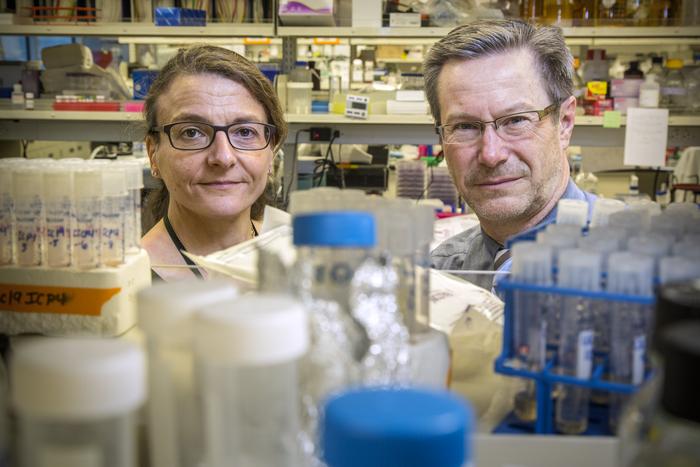SEATTLE — May 13, 2024 — Researchers at Fred Hutch Cancer Center have found in pre-clinical studies that an experimental gene therapy for genital and oral herpes removed 90% or more of the infection and suppressed how much virus can be released from an infected individual, which suggests that the therapy would also reduce the spread of the virus.

Credit: Fred Hutch Cancer Center
SEATTLE — May 13, 2024 — Researchers at Fred Hutch Cancer Center have found in pre-clinical studies that an experimental gene therapy for genital and oral herpes removed 90% or more of the infection and suppressed how much virus can be released from an infected individual, which suggests that the therapy would also reduce the spread of the virus.
“Herpes is very sneaky. It hides out among nerve cells and then reawakens and causes painful skin blisters,” said Keith Jerome, MD, PhD, professor in the Vaccine and Infectious Disease Division at Fred Hutch. “Our aim is to cure people of this infection, so that they don’t have to live with the worry of outbreaks or of transmitting it to another person.”
Published May 13 in Nature Communications, Jerome and his Fred Hutch team published an encouraging step toward a gene therapy for herpes.
The experimental gene therapy involves injecting into the blood a mixture of gene editing molecules that seek out where the herpes virus resides in the body. The mixture includes laboratory-modified viruses called a vector — commonly used in gene therapies — plus enzymes that work like molecular scissors. Once the vector reaches the clusters of nerves where the herpes virus hangs out, the molecular scissors snip away at the herpes virus’s genes to damage them or remove the virus entirely.
“We are using a meganuclease enzyme that cuts in two different places in the herpes virus’s DNA,” said first author Martine Aubert, PhD, principal staff scientist at Fred Hutch. “These cuts damage the virus so much that it can’t repair itself. Then the body’s own repair systems recognize the damaged DNA as foreign and get rid of it.”
Using mouse models of the infection, the experimental therapy eliminated 90% of herpes simplex virus 1 (HSV-1) after facial infection, also known as oral herpes, and 97% of herpes HSV-1 after genital infection. It took about a month for the treated mice to show these reductions, and the reduction of virus seemed to get more complete over time.
In addition, the researchers found that the HSV-1 gene therapy had a significant reduction in both the frequency and amount of viral shedding.
“If you talk to people living with herpes, many are worried about whether their infection will transmit to others,” Jerome said. “Our new study shows that we can reduce both the amount of virus within the body and how much virus is shed.”
The Fred Hutch team also simplified their gene editing treatment, making it safer and easier to make. In a 2020 study, they used three vectors and two different meganucleases. The latest study uses just one vector and one meganuclease capable of cutting the virus DNA in two places.
“Our streamlined gene editing approach is effective at eliminating the herpes virus and has less side effects to the liver and nerves,” Jerome said. “This suggests that the therapy will be safer for people and easier to make, since it has fewer ingredients.”
While the Fred Hutch scientists are encouraged by how well the gene therapy works in animal models and are eager to translate the findings to treatments for people, they are also careful about the steps needed to prepare for clinical trials. They also noted that though the current study examined HSV-1 infections, they are working on adapting the gene editing technology to target HSV-2 infections.
“We’re collaborating with numerous partners as we approach clinical trials so we align with federal regulators to ensure safety and effectiveness of the gene therapy,” Jerome said. “We deeply appreciate the support of herpes advocates as they share our vision for curing this infection.”
Herpes simplex virus (HSV) is a common infection that lasts a lifetime once people are infected. Current therapies can only suppress but not completely eliminate symptoms, which include painful blisters. According to the World Health Organization, an estimated 3.7 billion people under the age of 50 (67%) have HSV-1, which causes oral herpes. An estimated 491 million people aged 15-49 (13%) worldwide have HSV-2, which causes genital herpes.
Herpes can create other harms to people’s health. HSV-2 increases the risk of acquiring HIV infection. Other studies have linked dementia with HSV-1.
The work was funded by the National Institutes of Health, the Caladan Foundation and more than 2,000 donors. The meganucleases used in this research are derivatives of commercially-available meganucleases.
Note: Scientists at Fred Hutch played a role in developing these discoveries, and Fred Hutch and certain of its scientists may benefit financially from this work in the future.
###
Media contact:
Molly McElroy
mwmcelro@fredhutch.org
Fred Hutchinson Cancer Center unites individualized care and advanced research to provide the latest cancer treatment options while accelerating discoveries that prevent, treat and cure cancer and infectious diseases worldwide.
Based in Seattle, Fred Hutch is an independent, nonprofit organization and the only National Cancer Institute-designated cancer center in Washington. We have earned a global reputation for our track record of discoveries in cancer, infectious disease and basic research, including important advances in bone marrow transplantation, immunotherapy, HIV/AIDS prevention and COVID-19 vaccines. Fred Hutch operates eight clinical care sites that provide medical oncology, infusion, radiation, proton therapy and related services. Fred Hutch also serves as UW Medicine’s cancer program.
Journal
Nature Communications
Method of Research
Experimental study
Subject of Research
Animals
Article Title
Gene editing for latent herpes simplex virus infection reduces viral load and shedding in vivo
Article Publication Date
13-May-2024
COI Statement
None



